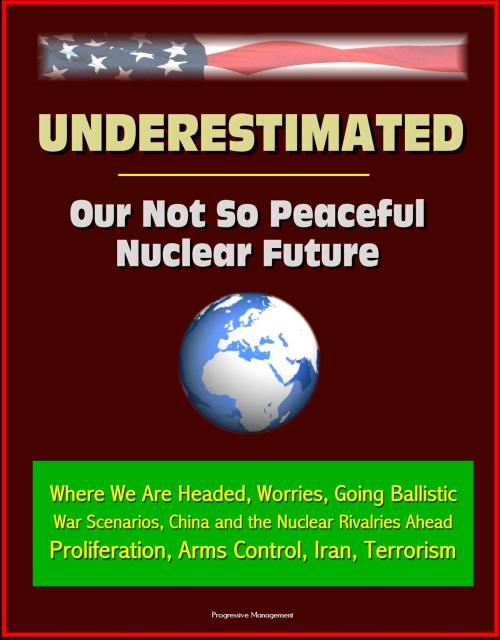Underestimated: Our Not So Peaceful Nuclear Future - Where We Are Headed, Worries, Going Ballistic, War Scenarios, China and the Nuclear Rivalries Ahead, Proliferation, Arms Control, Iran, Terrorism
Nonfiction, History, Military, Nuclear Warfare| Author: | Progressive Management | ISBN: | 9781311317131 |
| Publisher: | Progressive Management | Publication: | March 2, 2016 |
| Imprint: | Smashwords Edition | Language: | English |
| Author: | Progressive Management |
| ISBN: | 9781311317131 |
| Publisher: | Progressive Management |
| Publication: | March 2, 2016 |
| Imprint: | Smashwords Edition |
| Language: | English |
Professionally converted for accurate flowing-text e-book format reproduction, this study provides a good picture of the growing stockpiles of separated plutonium and the stockpiles of highly enriched uranium, as well as the likely expansion of nuclear power programs in additional countries. Henry Sokolski has written an excellent, short book about what he sees as our not so peaceful nuclear future. While short in length, it covers a lot of ground, and because it is extensively footnoted, it can lead readers to the broader literature.
List of Acronyms * Introduction * What We Think * Reservations * Optimists All * Where We Are Headed * Looking Backward * Why Worry? * Going Ballistic * War Scenarios * China and the Nuclear Rivalries Ahead * Other Interested Parties * What Might Help * Thinking Ahead
As we think about the likelihood of the proliferation of nuclear weapons, we should be aware that developing nuclear weapons may be easier as time passes and computing power increases, high energy explosives improve, and diagnostic technology advances. Sokolski includes a discussion of the question, does it matter if more countries have nuclear weapons? He points out that a number of respected people say it does not; some say it would be a more stable world. Sokolski disagrees, for two reasons. First, those who say it will not matter tend to assume that deterrence of attacks by others is almost automatic. There is little discussion of the vulnerability of the weapons, delivery systems, command and control systems, and more. Having a well-protected second-strike capability historically was not automatic; it took time and effort, changed operational practices, etc. Second, the Russians have been writing for at least 15 years of the need they have for tactical nuclear weapons to defend their large territory, because they say they do not have the resources to defend conventionally. They call for a new generation of nuclear weapons that would be easier to use. They more recently developed an interest in the early use of tactical nuclear weapons to quickly de-escalate a conflict.
If such use occurred, especially if it led to the successful de-escalation of a conflict on their borders, it might be a trigger for an avalanche of proliferation, a much larger avalanche than, in the case of Iran, getting nuclear weapons, which has been the subject of several studies in recent years. The successful Russian use would be the first operational use of nuclear weapons in many decades and would revive consideration of the value of tactical nuclear weapons. In any case, it is not clear that this would be a very peaceful world.
Professionally converted for accurate flowing-text e-book format reproduction, this study provides a good picture of the growing stockpiles of separated plutonium and the stockpiles of highly enriched uranium, as well as the likely expansion of nuclear power programs in additional countries. Henry Sokolski has written an excellent, short book about what he sees as our not so peaceful nuclear future. While short in length, it covers a lot of ground, and because it is extensively footnoted, it can lead readers to the broader literature.
List of Acronyms * Introduction * What We Think * Reservations * Optimists All * Where We Are Headed * Looking Backward * Why Worry? * Going Ballistic * War Scenarios * China and the Nuclear Rivalries Ahead * Other Interested Parties * What Might Help * Thinking Ahead
As we think about the likelihood of the proliferation of nuclear weapons, we should be aware that developing nuclear weapons may be easier as time passes and computing power increases, high energy explosives improve, and diagnostic technology advances. Sokolski includes a discussion of the question, does it matter if more countries have nuclear weapons? He points out that a number of respected people say it does not; some say it would be a more stable world. Sokolski disagrees, for two reasons. First, those who say it will not matter tend to assume that deterrence of attacks by others is almost automatic. There is little discussion of the vulnerability of the weapons, delivery systems, command and control systems, and more. Having a well-protected second-strike capability historically was not automatic; it took time and effort, changed operational practices, etc. Second, the Russians have been writing for at least 15 years of the need they have for tactical nuclear weapons to defend their large territory, because they say they do not have the resources to defend conventionally. They call for a new generation of nuclear weapons that would be easier to use. They more recently developed an interest in the early use of tactical nuclear weapons to quickly de-escalate a conflict.
If such use occurred, especially if it led to the successful de-escalation of a conflict on their borders, it might be a trigger for an avalanche of proliferation, a much larger avalanche than, in the case of Iran, getting nuclear weapons, which has been the subject of several studies in recent years. The successful Russian use would be the first operational use of nuclear weapons in many decades and would revive consideration of the value of tactical nuclear weapons. In any case, it is not clear that this would be a very peaceful world.















